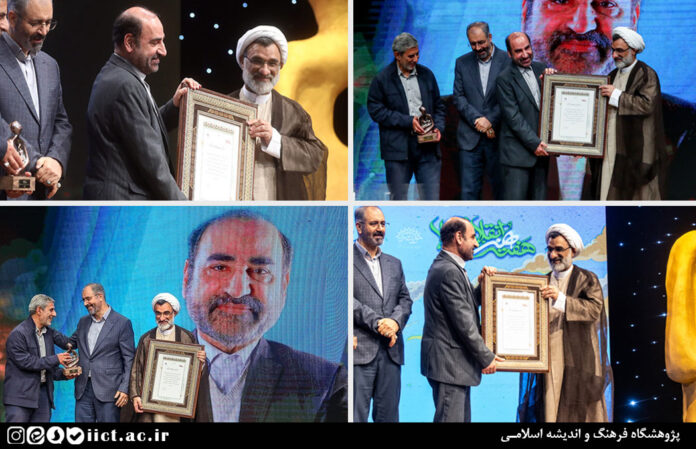According to the Public Relations of the Research Institute for Islamic Culture and Thought, during the closing ceremony of the Revolutionary Art Week, held on April 20, 2025, at the Islamic Art House, Dr. Mohammad Reza Sangari was named the Immortal Figure of Revolutionary Art for the year 2024.
According to the Public Relations of the Islamic Revolution Arts House, the closing ceremony began with a recitation of the Holy Quran, followed by a performance by the Symphony Orchestra, featuring singer Amir Hossein Samiei, with the piece “Iran,” and a performance by Resalat Bozari.
In another part of the ceremony, the “Figure of the Year 2024 in Revolutionary Art” nominees were announced based on their activities in 2024. Dr. Mohammad Reza Sangari, head of the Literature and Thought Department at the Research Institute for Islamic Culture and Thought, was honored as the Immortal Figure of Revolutionary Art and recognized for his outstanding contributions.
Mohsen Momeni Sharif spoke about Mohammad Reza Sangari, stating: “He is a prominent figure in the field of oration at the gatherings of Hazrat Seyyed al-Shuhada (AS), known for his captivating and unparalleled speeches at religious assemblies. A friend from his hometown mentioned that his father had attended his speeches for forty years and had never heard him repeat a single word.”
He continued, “Dr. Sangari is also a distinguished author in the fields of literature and educational textbooks, with many students throughout the years familiar with his name and writings. In the field of research and inquiry, every artist involved in the themes of Ashura and the movement of Imam Hussein (AS) needs his works. Sangari has delved into the personalities of this movement with great detail and precision, and I have not encountered a similar profound perspective elsewhere. His research is invaluable to artists.”
Mohsen Momeni Sharif Highlights Mohammad Reza Sangari’s Influence in the Foundation of Cultural and Artistic Movements
Mohsen Momeni Sharif emphasized: “In the realm of creating and founding cultural and artistic movements, Mohammad Reza Sangari has made significant contributions to the field of religious literature. I will mention three of his notable achievements: First, Mohammad Reza Sangari and his colleagues, such as the late Mardaniha, Ahad Deh Bozorgi, and Khosrow Aghayari, in the late 1980s and early 1990s, when the Ministry of Education held student camps in Ramsar, mentored a group of students and enthusiasts of religious literature, many of whom are now prominent figures in this field. Second, the Ashura Poetry Night in Shiraz, which has been held for the past forty years, with Mohammad Reza Sangari as the intellectual and academic center of this movement. Third, the Literary Think Tank for Resistance Literature, founded by Mohammad Reza Sangari, which will, God willing, continue to bear fruit in the coming years.”
He added, “If I were to highlight one dimension of his multifaceted personality, it would undoubtedly be his role as a teacher. Whether in the classrooms of Tehran University, in the alleys and streets, or any other setting, Mohammad Reza Sangari is always a teacher, and there is always something to learn from him.”
The closing ceremony of the Revolutionary Art Week also featured the orchestra and Amir Hossein Samiei performing the anthem “Ey Iran” and screening the film Ashk-e-Hoor.
Notably, among those present at the closing ceremony of Revolutionary Art Week were: Hojjat al-Islam Mohammad Qomi, Head of the Islamic Propagation Organization, Mohammad Mahdi Dadman, Head of the Islamic Revolution Arts House, Hojjat al-Islam Abdul Hossein Khosropanah, Secretary of the Supreme Council of the Cultural Revolution, Gholamali Haddad-Adel, Head of the Academy of Persian Language and Literature, Morteza Serhengi, Raziyeh Tejar, Ali Mohammad Modab, Ebrahim Hatami-Kia, Ghadir Ashna, Abdulhamid Qadirian, Wahid Yaminpour, Hassan Rouh al-Amin, Farzaneh Fakhrian, Masoud Najabati, Seyed Masoud Shojai-Tabatabai, Mohsen Momeni-Sharif, and Jamal Shourjeh.




